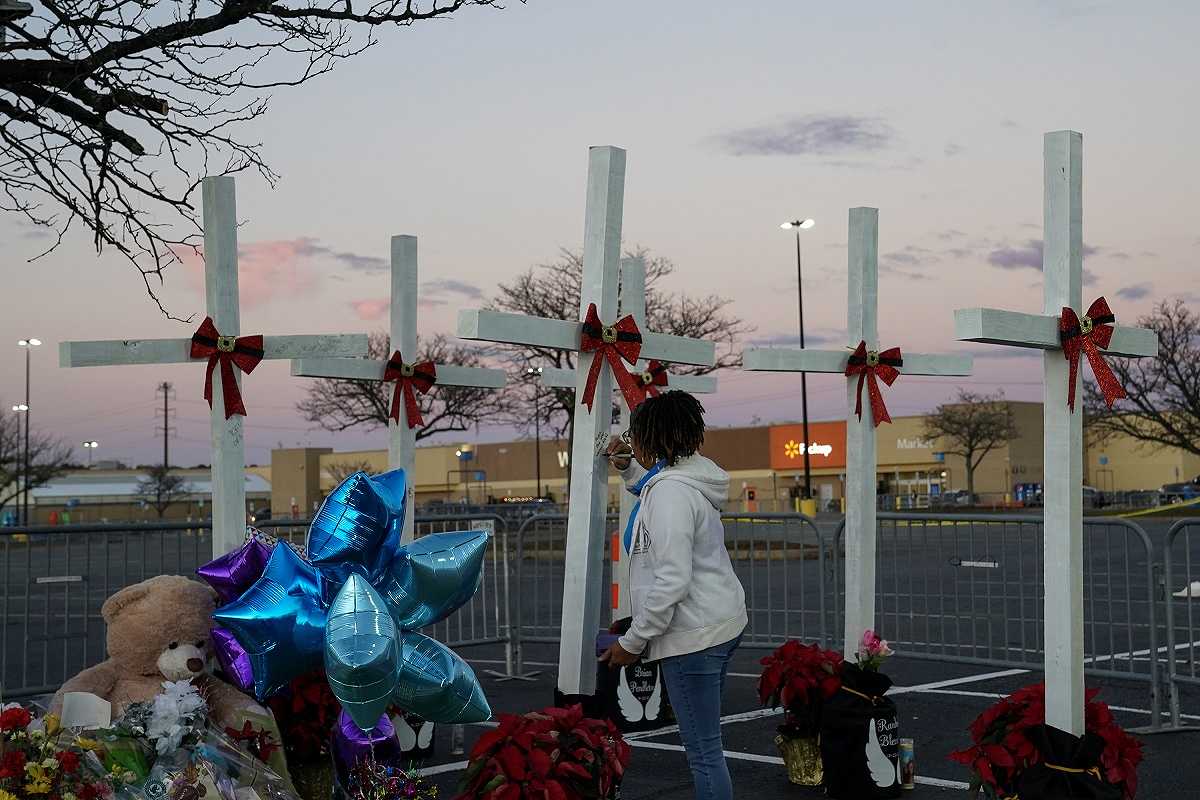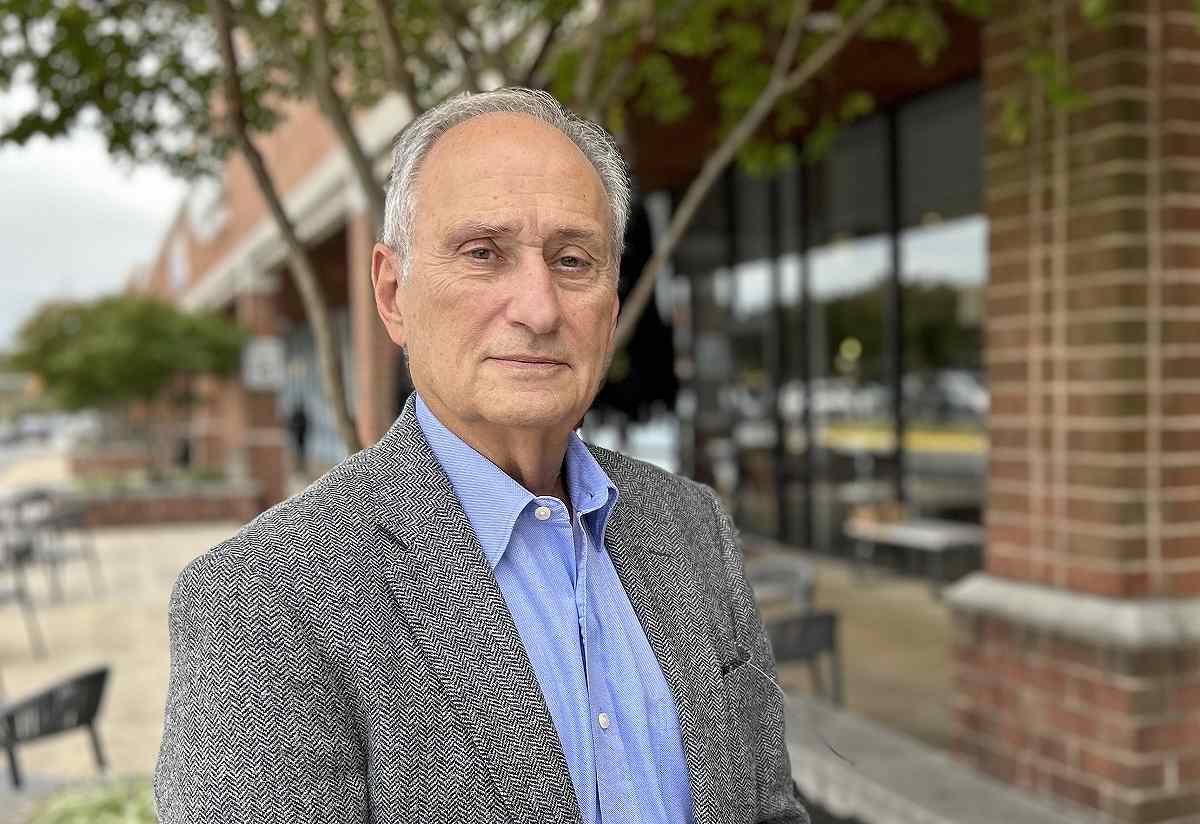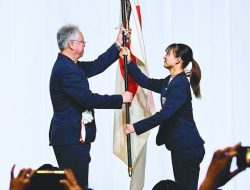
Frances Shelton writes a message on a wooden cross outside the Walmart in Chesapeake, Va., last year after a supervisor there shot six of her co-workers before taking his own life.
12:19 JST, October 15, 2023
In 2022, America suffered more than 36 mass killings, where four or more people were killed not including the shooter. One of those was in a Chesapeake, Va., Walmart, where six people were killed, and six were wounded in November. Nationwide, according to Washington Post data, 186 people died and 91 wounded in mass killings last year.
The aftermath of such shootings is a chaotic jumble of grief, vigils, funerals and financial upheaval. Donations flow in, but who gets the money? Insurance covers some costs, but often runs out. Who qualifies for financial help in the wake of such sudden, horrific tragedy?
Virginia has now taken steps to answer those questions. Legislators in the General Assembly approved a $10 million, one-time appropriation to create the Virginia Mass Violence Care Fund, which experts said is the first of its kind in the nation, designed to provide prompt assistance to victims, survivors and their families when other sources of financial help dry up. After the budget process was delayed for months beyond the end of the legislative session, Gov. Glenn Youngkin (R) signed the budget, and the fund, into law on Sept. 14.
The driving force for the creation of Virginia’s mass shooting victims’ fund was Joseph Samaha of Centreville, Va., whose daughter Reema was slain in the 2007 Virginia Tech shootings. Samaha has helped oversee the VTV [Virginia Tech Victims] Family Outreach Foundation and its VTVCare endowment fund and has learned a lot about the long-term impact of mass shootings over the last 16 years.

Joseph Samaha of Centreville, Va., helped create the Mass Violence Care Fund in Virginia to provide financial assistance to victims of mass shootings. It is the first of its kind in the nation.
Their needs “go beyond one or two years,” Samaha said of survivors and victims’ families. “They last a lifetime. And there needs to be a continuum of care. There’s a cost to all of that. If gun prevention, violence prevention is not working, communities and society need to be prepared right now on how to help these families and survivors in the aftermath. The injuries and the grief and the PTSD do not go away.”
Samaha said of the 177 survivors and families from Virginia Tech, “I personally know of injured survivors that still need medical care for their physical injuries 16 years later, including lead still seeping into their system from bullet fragments. A person that still has pain in their hand from being shot.” Claims spiked nine years after the shooting, Samaha said, and $645,000 had been reimbursed in the first 14 years. Victims are defined as families of the deceased, injured or traumatized survivors and those who were present during the event.
The Virginia Tech survivors and families will not be eligible for the new fund, Samaha said, because of settlements reached with the state in that case that created a separate endowment.
Former journalist Anita Busch founded Victims First after she realized that the torrent of funds donated to victims in the wake of mass shootings doesn’t always go entirely to the victims. Her cousin was slain in the Aurora, Colo., movie theater shooting in 2012, and she has worked since to establish funds directed to mass shooting victims that can’t be diverted to other groups.
“This is a forward-thinking solution,” Busch wrote in an email of the new Virginia fund, “to take care of long-term financial needs for victims and survivors of mass violence. Currently, nonprofits are re-victimizing mass violence victims as they hold onto donations that are not meant for the nonprofit. The Virginia Mass Violence Care Fund helps to restrain the mass shooting industrial complex that’s developed over the past decade. As victim advocates on the frontlines of so many mass casualties directly assisting victims, we fully endorse this model.”
“I think it is a reflection of our times,” said state Sen. George Barker (D-Fairfax), who helped sponsor the budget amendment that created the new fund. “It’s something that we need to respond to. And the worst thing you can do in a situation like this is to do nothing. And unfortunately, in many instances, that’s what happens. When [a shooting] happens, we need to be able to help, and now we can.”
Samaha’s plan is for the $10 million to be invested in various markets, and make enough in gains and interest that the $10 million can remain untouched. The Virginia Tech fund has had a nearly 9 percent return on investment, managed by the state retirement system. But because of a political squabble in the General Assembly, the new funds won’t be available until about 2026, Samaha said.
The fund requires a working group to determine who would be eligible to receive money from it, who would handle the investment of the initial $10 million, and who would declare that an event qualified as a mass shooting. The original budget amendment called for the working group to make recommendations on these issues by Nov. 1, and the General Assembly would then enact a bill in the 2024 session to codify the guidelines for the fund.
But when the 2023 legislative session ended, legislators hadn’t agreed on a budget because of differences over Youngkin’s proposed tax cuts. An agreement was reached over the summer, but the budget wasn’t signed until Sept. 14. Samaha said state officials told him there wasn’t enough time to gather a work group and hammer out the substantive issues for the fund in six weeks.
Instead, the work group now has a deadline of Sept. 1 of next year. A number of other legislative initiatives also were pushed back a year, Samaha was told. The General Assembly will then consider a bill to launch the fund in the 2025 session, and Samaha said he doubted any funds could be available for victims before 2026.
Samaha said supporters of the fund had already lined up members of the work group and guidelines for how the money should be disbursed. “The longer the money just sits there, doing nothing, . . . the longer people are not getting the help that they need,” Samaha said. He was particularly concerned for the families and survivors of the 2019 shooting in Virginia Beach, where 12 people were killed. He thanked them for “their courage, support and advocacy during their ongoing grief and pain.”
Jeffrey Dion, executive director of the National Compassion Fund, which helps process donations after mass shootings, said he has offered to join the work group figuring out the details of the Virginia fund. “I think it’s really important,” Dion said, “and I applaud Virginia for taking steps to recognize the long-term needs associated with victims of mass violence.”
Top Articles in News Services
-

Survey Shows False Election Info Perceived as True
-

Hong Kong Ex-Publisher Jimmy Lai’s Sentence Raises International Outcry as China Defends It
-

Japan’s Nikkei Stock Average Touches 58,000 as Yen, Jgbs Rally on Election Fallout (UPDATE 1)
-

Japan’s Nikkei Stock Average Falls as US-Iran Tensions Unsettle Investors (UPDATE 1)
-

Trump Names Former Federal Reserve Governor Warsh as the Next Fed Chair, Replacing Powell
JN ACCESS RANKING
-

Producer Behind Pop Group XG Arrested for Cocaine Possession
-

Japan PM Takaichi’s Cabinet Resigns en Masse
-

Man Infected with Measles Reportedly Dined at Restaurant in Tokyo Station
-

Israeli Ambassador to Japan Speaks about Japan’s Role in the Reconstruction of Gaza
-

Videos Plagiarized, Reposted with False Subtitles Claiming ‘Ryukyu Belongs to China’; Anti-China False Information Also Posted in Japan























